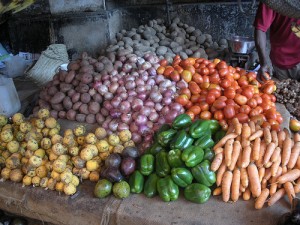By Janeen Madan
On Saturday, November 6th, Washington D.C.’s most popular food trucks gathered outside the National Museum of American History. Usually hungry customers need to follow the locations of the trucks via twitter, but today they were parked in the same spot to participate in The Lemelson Center’s Food for Tomorrow: New Perspectives on Invention and Innovation Symposium.

This two-day event (November 5th – 6th) brought together farmers, scientists, researchers, nutritionists, and writers to discuss the role of innovation in food production and consumption. Participants feasted on Simply Sausage’s meat from heritage breed pigs in Maryland, Fry Captain’s pumpkin-flavored milkshakes, and Takorean’s fusion Korean Tacos.
The symposium’s schedule included a series of panel discussions focusing on innovations in the field, in the kitchen and at the table. Other events included a movie preview of Truck Farm, a film about urban farms taking root in New York City, and a scavenger hunt to discover the museum’s food-related objects.
Nourishing the Planet co-Project Director, Brian Halweil, participated in the panel, “In the Field: Producing Food for Tomorrow.”
Also speaking on the panel with Brian was Steven Craig, research scientist at Virginia Cobia Farms, and Jane Silverthorne, manager of the National Science Foundation Plant Genome Research Program.
Brian’s presentation highlighted 3 major shifts that he said we are already beginning to see in the global food system.
First, our food is becoming more local. Over the last 15 years, the number of farmers markets across the U.S. has tripled; and driven by consumer demand for local products, even WalMart and Costco are looking to source locally.
Second, instead of increasing food production, we will need to focus on reducing food waste and finding better ways to consume the food that we already produce.
Brian highlighted some of the simple, low-cost fixes we have seen on the ground in sub-Saharan Africa. The inexpensive three-layer bag developed by Purdue University, for example, is helping to preserve cowpeas, an important dietary staple in West Africa. This simple innovation can raise a family’s annual income by $150. (see Innovation of the Week: Investing in Better Food Storage in Africa.)
Finally, farmers will be at the frontlines of climate change. Innovations in how we produce food can help reduce greenhouse gases by 25 percent. Better management of livestock and planting more trees are just some of the basic practices that can add up to a lot, when multiplied by millions of farmers worldwide. Already, several projects across sub-Saharan Africa are in the works to compensate farmers and rural communities for storing carbon in the soils.
Innovative ways to reduce hunger and poverty in sub-Saharan Africa are featured in the upcoming State of the World 2011: Innovations that Nourish the Planet. By helping to slow climate change, improve health, and provide sustainable incomes, food can be a solution to nourish the planet and our bodies.
From research labs to farmers’ fields, the Food for Tomorrow symposium highlighted a wide-range of innovations that represent an untapped potential for feeding the future.
Janeen Madan is a research intern with the Nourishing the Planet project.

Danielle Nierenberg, an expert on livestock and sustainability, currently serves as Project Director of State of World 2011 for the Worldwatch Institute, a Washington, DC-based environmental think tank. Her knowledge of factory farming and its global spread and sustainable agriculture has been cited widely in the New York Times Magazine, the International Herald Tribune, the Washington Post, and
other publications.
Danielle worked for two years as a Peace Corps volunteer in the Dominican Republic. She is currently traveling across Africa looking at innovations that are working to alleviate hunger and poverty and blogging everyday at Worldwatch Institute’s Nourishing the Planet. She has a regular column with the Mail & Guardian, the Kansas City Star, and the Huffington Post and her writing was been featured in newspapers across Africa including the Cape Town Argus, the Zambia Daily Mail, Coast Week (Kenya), and other African publications. She holds an M.S. in agriculture, food, and environment from Tufts University and a B.A. in environmental policy from Monmouth College.








